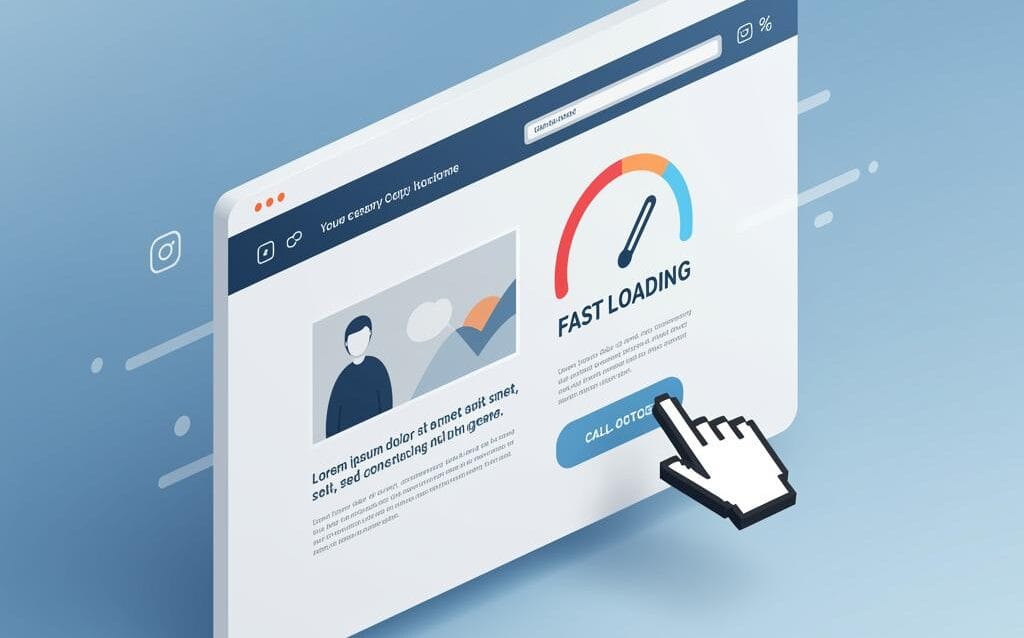Fast Website = High Conversions: Speed Up Your Site Now
How a Fast-Loading Website Can Increase Your Conversions
In today’s fast-paced digital world, users expect websites to load instantly. A slow-loading website can be the difference between making a sale and losing a customer. This post will explore how a fast-loading website can significantly impact your conversion rates and provide actionable insights to improve your website’s speed.
The Impact of Speed on User Experience
Website speed directly influences user experience. A slow website creates frustration, leading to higher bounce rates and lower engagement. Users are less likely to complete desired actions, such as making a purchase or filling out a form, if they perceive the website as sluggish.
Reduced Bounce Rates
A fast-loading website keeps users engaged and encourages them to explore further. Studies show a strong correlation between page load time and bounce rate. Every second of delay can significantly increase the likelihood of a user leaving your site.
Improved User Engagement
When a website loads quickly, users are more likely to interact with its content, browse multiple pages, and ultimately convert. A seamless and responsive experience fosters positive user engagement, leading to increased time on site and higher conversion rates.
The SEO Benefits of a Fast Website
Search engines, like Google, prioritize user experience. Website speed is a crucial ranking factor. A faster website improves your search engine rankings, leading to increased organic traffic and visibility.
Higher Search Rankings
Google explicitly states that page speed is a ranking signal. By optimizing your website’s loading time, you improve your chances of ranking higher in search results, driving more organic traffic to your site.
Increased Organic Traffic
Improved search rankings translate to increased visibility and organic traffic. A faster website attracts more visitors from search engines, expanding your reach and potential customer base.
Optimizing Your Website for Speed
There are several practical steps you can take to improve your website’s loading speed. Implementing these strategies can significantly impact your conversion rates and overall website performance.
Optimize Images
Large image files are a common culprit for slow loading times. Compressing images and using appropriate file formats (like WebP) can dramatically reduce page size without sacrificing quality.
Leverage Browser Caching
Browser caching allows repeat visitors to load your website faster by storing static assets like images and scripts locally. This reduces the amount of data that needs to be downloaded on subsequent visits.
Minimize HTTP Requests
Each element on your webpage, such as images, scripts, and stylesheets, requires a separate HTTP request. Reducing the number of these requests by combining files and minimizing external resources can significantly improve loading speed.
Choose a Reliable Hosting Provider
Your hosting provider plays a crucial role in your website’s speed. Opting for a reliable and high-performance hosting plan can significantly impact your loading times and overall website performance.
Mobile Optimization is Crucial
With the increasing dominance of mobile browsing, optimizing your website for mobile devices is essential. A mobile-friendly website that loads quickly is crucial for capturing mobile users and driving conversions.
Responsive Design
Implementing a responsive design ensures your website adapts seamlessly to different screen sizes and devices, providing a consistent user experience across all platforms.
AMP (Accelerated Mobile Pages)
Consider implementing AMP, a framework for creating lightweight and fast-loading mobile web pages. AMP can significantly improve mobile page speed and user experience.
Conclusion
A fast-loading website is no longer a luxury but a necessity for online success. By prioritizing website speed, you can significantly improve user experience, boost search engine rankings, and ultimately increase your conversions. Implementing the strategies outlined in this post can help you achieve a faster, more efficient website that drives results.

